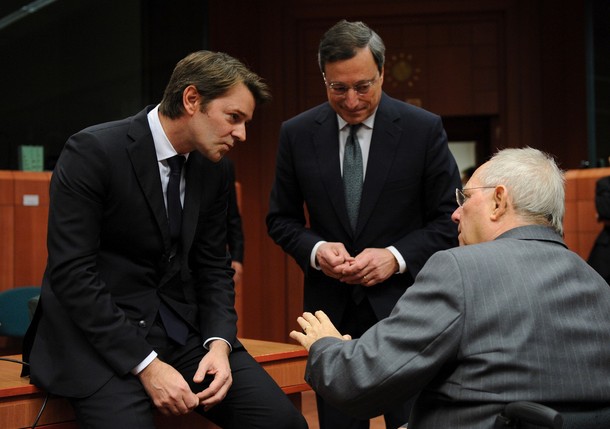On December 1, 2011, the Council’s Global Business and Economics Program hosted a conference call with André Sapir, senior fellow at Bruegel and a member of the Council’s Business and Economics Advisory Group, and Jacob Funk Kirkegaard, research fellow at the Peterson Institute on International Economics, on the latest developments in Europe’s sovereign debt crisis.
There finally seems to be a light at the end of the tunnel. After more than two long years of negotiations and spreading contagion, Europe’s leaders seem finally to recognize the drastic steps necessary to convince markets they have the political will to deal with the critical design flaws of the eurozone. With a properly enforced fiscal pact providing oversight of national budgets to prevent systemic risks in place, the ECB has signaled its willingness to act in the short term to ensure continued liquidity. Between the fiscal compact and ECB lifeline, the eurozone may yet rebound.
Europe is facing a clear turning point in resolving its debt crisis. Today’s speech by European Central Bank President Mario Draghi to the European Parliament made clear the ECB is willing to take stronger bond market interventions if it sees the right political actions. As France and Germany continue to debate the details of the proposed “fiscal compact” designed to ensure EU oversight of national budgets, Draghi hinted that the ECB would respond favorably to political decisions by Europe’s leaders to create a fiscal union that should have accompanied monetary union in the first place. This could mark a significant turning point in Europe.
Popular criticism of the ECB has been overblown—and misplaced. Throughout the crisis, critics have attacked the ECB for not acting swiftly or significantly enough to calm markets, and for not serving as a lender of last resort to Europe’s troubled sovereigns. Yet, as Jacob Kirkegaard noted on the call, without the ECB’s deliberate decision to delay massive interventions, fiscally unsound regimes from Italy to Spain to Greece would likely still be in power—with little incentive to resolve their underlying fiscal problems. By emphasizing the ECB’s willingness to act only after the political decisions to coordinate fiscal policy have been made final, the ECB has in fact been a powerful agent of political change towards fiscal solvency throughout Europe.
Yet, domestic politics—particularly in France—still threaten to derail a potential deal. As André Sapir pointed out, France has the most at stake in the current negotiations, yet its public debate on the issue is far less advanced than in Germany. France’s bond yields are edging higher and higher, and the pressure is mounting on Paris to act to maintain its coveted AAA bond rating. At the same time, only six years ago, France voted against the European Constitutional Treaty in part because of an unwillingness to transfer additional sovereignty to Brussels. It is a difficult tightrope for President Nicolas Sarkozy to walk in an election year to justify ceding budgetary authority and oversight to an unelected set of bureaucrats in Brussels. He will need to explain to his electorate that the future of the euro and the ability of France to maintain its leadership role in Europe depends on doing just that.
TRANSCRIPT
Image: eurogroupmtg.jpg
